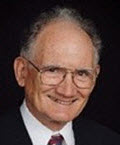Richard N. “Dick” Wright III, a structural engineering researcher who was highly respected within ASCE and throughout civil engineering for encouraging adoption of sustainability, has died at 87.

A native of Syracuse, New York, Wright, Ph.D., P.E., Dist.M.ASCE, NAE, earned his bachelor’s and master’s degrees at Syracuse University. By the time he earned his doctorate in civil engineering from the University of Illinois at Urbana-Champaign, he had worked for the Pennsylvania Railroad Company and served in the enlisted ranks in the U.S. Army Corps of Engineers’ Okinawa Engineering District. Thereafter he joined the Illinois faculty and rose to full professor.
In 1971, Wright accepted a position at the former National Bureau of Standards as chief of its building research division’s structures section. Once the bureau evolved into the National Institute of Standards and Technology, Wright assumed leadership of its Center for Building Technology. He founded NIST’s Building and Fire Research Laboratory and served as its director for many years.
Retirement didn’t see Wright slow down. He continued guiding projects to completion, supporting other professionals, and serving on ASCE committees focused on sustainability and adaptation to climate change. Two years ago, he co-edited a sustainable design textbook published by ASCE Press, “Engineering for Sustainable Communities.”
ASCE named Wright a Distinguished Member in 2002, and he received a President’s Medal in 2010. He was elected to the National Academy of Engineering in 2003. His many other honors include the National Society of Professional Engineers’ Federal Engineer of the Year (1988); the International Award of the Japan Society of Civil Engineers (2003); University of Illinois, College of Engineering, Alumni Award for Distinguished Service (2006); and the Hans Oser Standards Alumni Association Distinguished Service Award (2014).
Wright co-authored more than 100 research articles. In 2003 he published an institutional history of building and fire research at the National Bureau of Standards and NIST.
For the past 15 years, Wright had served as a research professor in the University of Maryland’s civil and environmental engineering department.
He is survived by his wife of 60 years, Teresa, four children and six grandchildren.
